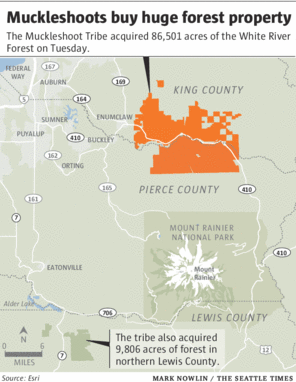The tribe is paying about $313 million for 96,000 acres along Highway 410 in King, Pierce and Lewis counties.
November 6, 2013 Seattle Times By Sanjay BhattThe Muckleshoot Indian Tribe has acquired 96,307 acres of forest in King, Pierce and Lewis counties for just over $313 million, its largest land purchase ever.
The transaction has both economic and cultural importance for the tribe, which bought the land from a partnership run by Boston-based investment manager Hancock Natural Resource Group .
 “This acquisition is another important step toward the Tribe’s goals of increasing our land base, reacquiring portions of our homeland and diversifying our economy,” said Muckleshoot Tribal Council Chairwoman Virginia Cross in a statement.
“This acquisition is another important step toward the Tribe’s goals of increasing our land base, reacquiring portions of our homeland and diversifying our economy,” said Muckleshoot Tribal Council Chairwoman Virginia Cross in a statement.
Cross said the Muckleshoots will manage the land “for the primary purpose of long-term sustainable timber harvest, while preserving natural values including fish and wildlife habitat, plant resources and areas of cultural importance.
“This working forest will provide jobs and revenue for important tribal government programs now and for future generations.”
The majority of the land is in King and Pierce counties, where the tribe paid $282 million for 86,501 acres of the White River Forest on both sides of Highway 410 between Enumclaw and Greenwater. In northern Lewis County, it bought 9,806 acres of forest land for nearly $32 million.
The sale wasn’t a total surprise to King County officials.
In March, County Executive Dow Constantine announced an $11.1 million agreement to buy the development rights on the 43,000 acres Hancock owned in King County — the largest block of privately owned land in the county not yet protected from development.
Without that pact, Hancock or a future landowner could have built 857 homes on 40- and 80-acre lots near the route to the Crystal Mountain ski resort and Chinook Pass.
But Wednesday, county officials said that conservation deal hadn’t closed yet.
Even though Hancock and the county had both signed the agreement, closing wasn’t to take place until the company sold the land, said Bob Burns, deputy director for the county’s Department of Natural Resources and Parks.
“It’s a top priority for the county to complete the conservation of that forestland,” Burns said. “We look forward to working with the tribe.”
According to its website, Hancock had $11.5 billion in timberland assets under management as of March, providing insurance companies, pension funds and other big investors with a way to diversify their assets. The company did not return a call seeking comment.
Hancock bought the White River Forest land from Weyerhaeuser in 2002 in a $37.9 million sale, county records show.
The Muckleshoots, with 2,317 tribal members, have been successful in diversifying its assets beyond its 3,860-acre reservation and its Auburn casino, considered one of the top three tribal casinos in the state.
The tribe has invested in the Four Seasons Hotel and Residences in downtown Seattle. In 2007, it paid $62.5 million for the Salish Lodge & Spa overlooking Snoqualmie Falls, which hotel experts say still holds the price-per-room record in the Seattle area.
In recording the land sales, the tribe notified King County officials it plans to continue using the forestland for timber production.
The King County forestland acquired by the tribe represents about one-fifth of the 232,000 acres that receive special tax treatment for timber production in the county.
Prices for timber have rebounded since 2009, lifted by demand from homebuilders and emerging markets in Asia.
Timber from private land can be exported, unlike timber from state and federal lands.
Buying back land lost through treaties and forced sales has been a priority, according to the tribe.
“The White River Forest is an important part of the tribe’s homeland,” Cross said in her statement. “Bringing this property into tribal ownership is the realization of a long-held goal of our people.”
Material from Seattle Times archives was used in this report.
Sanjay Bhatt: 206-464-3103 or sbhatt@seattletimes.com On Twitter @sbhatt
